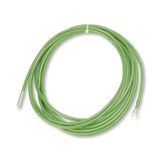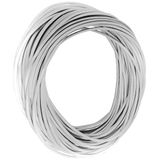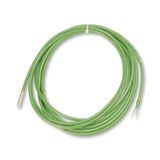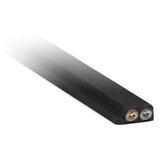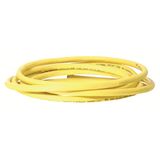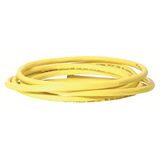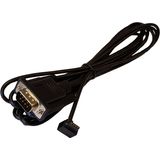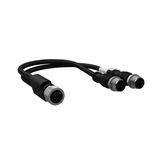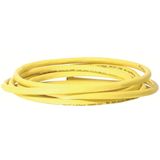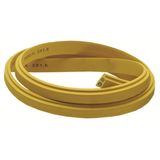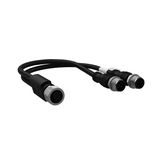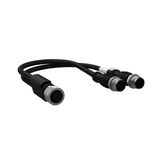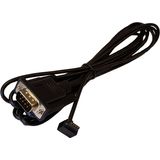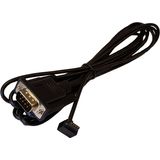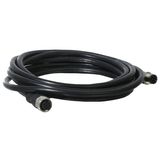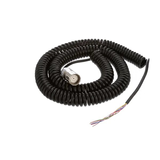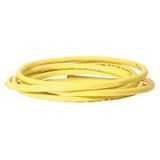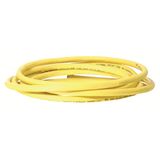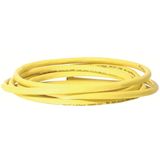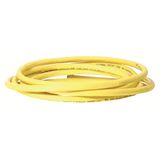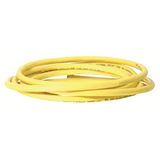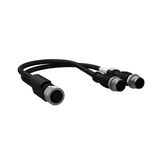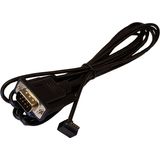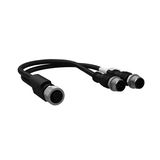ABB Cables and wires
Every installation starts with a cable. You can have the best relays, switches, or automation gear — but if the wiring’s bad, nothing else matters. That’s why professionals trust ABB cables and wires. They’re consistent, easy to work with, and built to handle real-world loads, not lab conditions.
Power cables that stay cool and solid
When it comes to feeding current through a building or a production line, ABB power cables are the backbone. The copper is pure, flexible, and evenly stranded — you can feel it when you strip the insulation. The conductor doesn’t fray or snap, and the sheath cuts clean without tearing.
These cables handle serious current without heating up. The insulation thickness is uniform, and the temperature rating actually means something — not a printed number that fades after the first summer in a hot cabinet.
Whether you’re wiring 230V control panels or 400V motors, ABB’s low-voltage power cables keep voltage drops low and performance steady. You run them once, crimp, and forget about them.
Installers like ABB because it saves time: predictable diameters, easy bending radius, clean markings every half meter. You know exactly what you’re working with.
Control cables that behave
Automation panels are full of signal lines that need clarity and order. ABB control cables handle that perfectly. Twisted pairs, shielded variants, numbered cores — everything you need for clean signal transmission without interference.
The shielding is dense and uniform, protecting against electromagnetic noise from drives, contactors, and inverters. You don’t get ghost signals or random PLC errors. The jacket resists oil and mechanical stress, which is key when the cables run through moving parts or tight ducts.
Even in high-vibration areas, ABB control cables stay reliable. The strands are fine enough to flex without breaking, and the insulation holds up against both heat and chemicals. That’s why you see them in factories, elevators, HVAC systems, and everywhere control wiring has to last.
Low-voltage cables that make life easier
Most of what we wire day to day falls into the low-voltage cable category — lighting, sockets, controls, sensors. ABB’s low-voltage range covers them all, from single-core wiring cable to multi-core flexible types.
The PVC and halogen-free versions are both available, depending on where the job is. For office buildings and public facilities, installers often pick the LSZH types — they don’t emit toxic smoke when heated, which keeps the installations compliant and safe.
What’s nice is how easy ABB cables are to route. They stay round, don’t kink, and don’t fight you when you pull them through conduits. It sounds small, but anyone who’s wired a few kilometers of cable knows how much that matters by the end of the day.
Wiring cables that don’t age overnight
A good ABB wiring cable doesn’t just work today — it works ten years from now. The insulation stays tight around the copper, even after thousands of heat cycles. The color coding doesn’t fade, and the markings stay legible.
These are the cables electricians use for everything: lighting runs, control loops, junction boxes, terminal strips. They crimp cleanly, take ferrules easily, and don’t shed insulation dust all over your tools. That’s the difference between premium cable and the cheap reels that make your day miserable.
Built for real installations
ABB’s entire cable line meets international standards — IEC, EN, and CE-certified. The mechanical strength, flame resistance, bending flexibility — all tested and documented. But what really matters is that it feels right when you work with it.
The copper’s smooth, the jacket peels clean, and the roll uncoils without memory. You save time on prep and get fewer mistakes during assembly. Over hundreds of terminations, that consistency adds up.
Wholesale supply and B2B support
At Bank of Lamps, we distribute the full range of ABB cables and wires, including power cables, control cables, low-voltage cables, and wiring cables — available for wholesale and B2B buyers across Europe.
We stock reels, pre-cut lengths, and industrial bundles for large installations. Orders ship quickly to Germany, France, Netherlands, UK, Spain, Baltics.
In the end, a cable’s job is simple — deliver power or signal without drama. ABB’s just happen to do that better, year after year.
